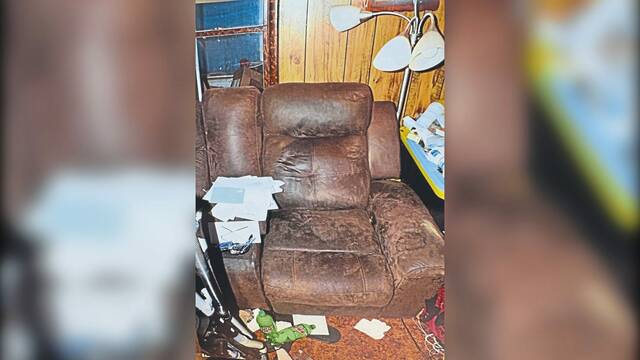Shane Skillpa said he was 16 when he suffered a concussion during a summer football practice at West Mifflin High School in 2009.
Although he “saw stars” and was dazed and confused, Skillpa claims his coaches had him return to practice.
Skillpa said he began exhibiting common concussion symptoms days later, and years after that, without any further head injuries, he began showing additional symptoms of brain injury.
His doctors told him that the new symptoms — memory impairment, difficulty concentrating, depression and anxiety, fatigue and spatial perception issues — stemmed from his original concussion.
In 2017, Skillpa filed a lawsuit against West Mifflin Area School District, the Pennsylvania Interscholastic Athletic Association and the Western Pennsylvania Interscholastic Athletic League, alleging negligence, breach of implied contract and fraudulent nondisclosure.
Because Skillpa filed his complaint within two years of the onset of the new symptoms, he was able to meet the statute of limitations.
The lawsuit accuses the defendants of failing to follow or require proper concussion protocols, including removing a potentially concussed student from the field of play and ensuring that the student received a medical exam and clearance before returning. The lawsuit said the defendants also allowed students to practice on a field that failed to provide adequate cushioning.
Jury selection in the civil trial before Allegheny County Common Pleas Judge Arnold Klein begins on Tuesday and is expected to include testimony from Dr. Bennet Omalu.
Omalu previously worked at the Allegheny County coroner’s office and his work studying brains after death eventually led to the widespread acceptance of Chronic Traumatic Encephalopathy, or CTE. He linked the condition to repeated hits to the head among football players.
Omalu was the inspiration for the 2015 film, “Concussion,” starring Will Smith.
Skillpa, 27, of West Mifflin, now works as a nurse at Jefferson Hospital. Because of his symptoms, he can only work about 20 hours a week, court filings said.
In his pretrial statement, his attorneys said that his doctors believe he has CTE and expect he will have a shortened life expectancy. He is also at increased risk for Parkinson’s disease and is required to take psychotropic medications.
Skillpa was a sophomore participating in summer practices on Aug. 24, 2009, when he was injured.
The lawsuit said Skillpa had been doing a one-on-one drill in which players run straight at each other and one player tries to tackle the other. Skillpa was involved in a helmet-to-helmet hit that broke the helmet he was wearing and drove the back of his head into the hard practice field turf, the lawsuit said.
“The hit was so violent and so powerful that both players’ helmets broke,” the lawsuit said. “(Skillpa’s) facemask was hanging down below his chinstrap, and he was left confused, dazed and ‘seeing stars’ after the impact.”
The complaint said Skillpa was not evaluated by any medical personnel. He was given a 15-minute break and told to get a new helmet.
He then returned to practice for several hours, as the team was having “three-a-days,” the lawsuit said.
A day or two after the hit, Skillpa sustained a similar hit during the same drill and again was left dazed. He then began experiencing headaches, light sensitivity and feeling unwell, according to the lawsuit.
He was diagnosed with a concussion on Aug. 31 and continued treatment until February 2011, the lawsuit said.
He never played football again.
The lawsuit said his symptoms continued for years, and he later developed new ones.
In 2016, Skillpa was diagnosed with new and distinct traumatic brain injuries, the lawsuit said.
“While both brain injuries were triggered by the blows delivered to Shane’s head while at football practice in 2009, this new traumatic brain injury originated in and affects different parts of the brain than the original concussion. (It) remained latent for years before manifesting and is progressing at a slow yet continual rate,” the lawsuit said.
Skillpa has been diagnosed with cognitive impairment, organic affective disorder, post-traumatic stress disorder and attention-deficit hyperactivity disorder — all secondary to traumatic brain injury.
The lawsuit alleges that all of his symptoms should be considered permanent, although they can improve with treatment.
Skillpa is seeking $2.6 million in damages for loss of income and medical costs, as well as damages for pain and suffering, loss of life expectancy and a decreased quality of life.
His attorneys said Skillpa is seeking more than $5 million in total.
Skillpa claims that West Mifflin failed to take player health seriously and that the PIAA and WPIAL need to establish enforceable regulations that hold schools, coaches and administrators responsible for violations.
“It’s more than just a lawsuit,” said attorney Anthony J. Plastino II, who represents Skillpa. “There are other policy implications that would apply statewide.”
“The essence of the case is that these organizations have not followed proper procedures and protocols,” added attorney Richard Sandow, who also represents the plaintiff.
The PIAA and WPIAL, the two bodies that govern high school sports in Pennsylvania, said in a pretrial statement that Skillpa is seeking to impose “untenable duties” on them and “ignore the realities of youth sports.”
They write that, with more than 1,400 member schools, each with various sports, there are thousands of practices and games occurring nearly every day.
“Neither the PIAA nor WPIAL can possibly be present at every game and every practice, for every sport, of every one of its member schools,” they wrote. “Accordingly, oversight and enforcement of concussion protocols and treatment necessarily rests, by statute and under the PIAA Constitution and by-laws, with the member schools.”
Under those rules, they argued, the principal of each school is responsible for compliance. In addition, coaching staffs and trainers are responsible for removing an injured student from playing.
The PIAA has no control over any aspect of that, their lawyers wrote.
At the time of Skillpa’s injury, West Mifflin contracted trainers from UPMC, which had policies in place that if a concussion was suspected, the student was removed from play, evaluated and referred to a physician.
West Mifflin said in its pretrial statement that the playing surface in use during the summer of 2009 was FieldTurf installed a year earlier. Attorneys for the school district said that FieldTurf was then, and is now, considered a state-of-the-art playing surface. They do not believe it contributed to any of Skillpa’s injuries.
The district also denied that Skillpa’s helmet broke. Instead, attorneys for West Mifflin said that it was a clip holding the face mask to the helmet that either broke or came off when a screw came out.
At the time of the hit, the district said, Skillpa was advised by a coach to see the trainer if he was injured, but he declined.
The district expects to call Dr. Mark R. Lovell as an expert witness during the trial. He is board certified in neuropsychology and was the founding director of the UPMC Sports Medicine Concussion Program. Lovell and Dr. Michael “Mickey” Collins, who was the CEO of the program, incorporated ImPACT Applications in 2002 and released ImPACT, a baseline concussion testing program, the same year.
Collins treated Skillpa when he was first injured in 2009.
According to West Mifflin’s attorneys, Lovell has said that Skillpa does not have post-concussion syndrome, traumatic encephalopathy or organic affective disorder.
“Further, Dr. Lovell opined that there is no evidence that (Skillpa) is cognitively compromised so that he cannot work as a registered nurse and any symptoms, anxiety or depression that (Skillpa) experiences is a long-term issue not related to any injury suffered in August 2009 while playing football,” West Mifflin’s attorneys said.








